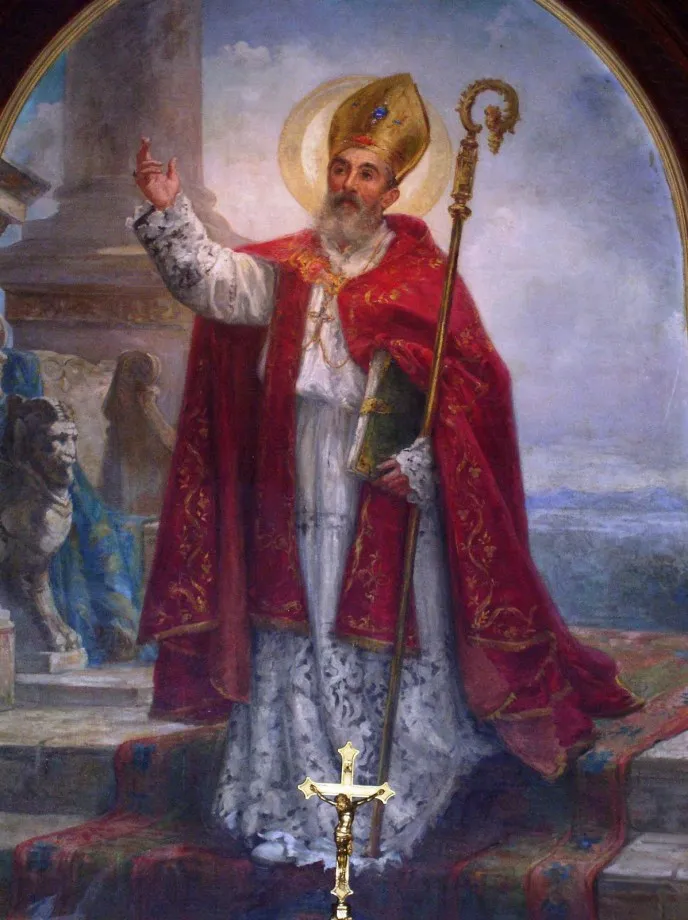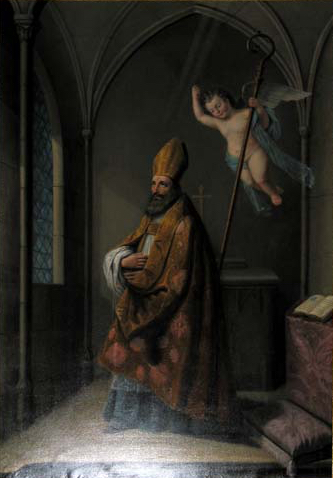
Catholic Saints
Saint Hilary of Poitiers (c. 310–367 AD), often called the "Athanasius of the West," was a bishop and theologian who staunchly defended the Nicene faith against Arianism in the fourth century. Born in Poitiers, Gaul (modern-day France), he converted from paganism to Christianity as an adult and rose to become bishop of his city around 350 AD. Exiled to Phrygia by the Arian Emperor Constantius II in 356 AD, Hilary used his banishment to deepen his theological work, producing masterpieces like De Trinitate. Returning to Gaul in 360 AD, he continued his fight against heresy, earning a reputation as a key figure in Western orthodoxy. Named a Doctor of the Church in 1851 by Pope Pius IX, his feast day is celebrated on January 13, honoring his enduring contributions to Trinitarian theology.
His feast day is celebrated on January 13.
Athanasius of the West
Born around 310 AD in Poitiers, Gaul, Saint Hilary of Poitiers emerged as a formidable champion of Christian orthodoxy, bridging the intellectual traditions of the West with the theological battles of the East. His conversion from paganism to Christianity and subsequent role as bishop marked him as a pivotal figure in defending the Nicene Creed against the pervasive Arian heresy.
Hilary was born into a wealthy, pagan family in Poitiers, a Roman city in western Gaul, around 310 AD, during a time when Christianity was still consolidating its presence in the region. Educated in rhetoric and philosophy, he initially embraced Neoplatonism, seeking truth through reason and contemplation. His intellectual journey led him to the scriptures, where he encountered the beauty and coherence of Christian doctrine, particularly in the Gospel of John and the writings of Moses. This discovery, coupled with his wife and daughter’s influence, prompted his conversion and baptism in his thirties, an event that transformed his life and set him on a path of spiritual leadership.
Around 350 AD, the Christian community of Poitiers, impressed by his piety and learning, elected him bishop despite his status as a married layman—a rare but not unprecedented occurrence in the early Church. His new role thrust him into the forefront of the Arian controversy, a theological dispute that had already engulfed the Eastern Church and was now spreading westward, challenging the divinity of Christ as affirmed at Nicaea in 325 AD.
Hilary’s classical education and newfound faith equipped him to tackle the Arian heresy, which asserted that Christ was a created being rather than co-eternal with the Father. Drawing on his rhetorical skills and deep study of scripture, Hilary emerged as a defender of the Nicene Creed, bringing a Western perspective to a debate dominated by Eastern theologians like Athanasius. His early writings as bishop, including commentaries on Matthew and the Psalms, laid the groundwork for his later, more systematic defense of Trinitarian doctrine, showcasing his ability to blend philosophical precision with theological insight.
In 356 AD, Hilary’s outspoken opposition to Arianism drew the ire of Emperor Constantius II, an Arian sympathizer who dominated the Roman Empire. At the Council of Biterrae (Béziers), Arian bishops, backed by imperial authority, accused Hilary of disrupting church unity and secured his exile to Phrygia in Asia Minor (modern-day Turkey). Far from silencing him, this banishment, lasting until 360 AD, became a period of immense productivity. Living among Eastern bishops, many of whom were also exiled for their orthodoxy, Hilary immersed himself in Greek theology, engaging with the works of Origen and Athanasius, and forging connections that enriched his understanding of the Trinity.
During these years, he composed his magnum opus, De Trinitate, a twelve-book treatise defending the co-equality and co-eternity of the Father, Son, and Holy Spirit. He also wrote De Synodis, seeking to reconcile semi-Arian bishops with orthodoxy, demonstrating his diplomatic skill and unwavering commitment to unity in truth. His exile, rather than a defeat, became a crucible that amplified his voice across the Christian world.
Hilary’s exile strengthened his resolve to protect the Nicene faith in the West. Upon returning to Poitiers in 360 AD, after Constantius’s policies weakened under pressure from orthodox bishops and the new Emperor Julian, Hilary resumed his episcopal duties with vigor. He confronted Arian leaders like Auxentius of Milan and Saturninus of Arles, organizing councils—such as the Synod of Paris in 361 AD—to reaffirm the Nicene Creed. His efforts helped stem the tide of Arianism in Gaul, earning him the title "Hammer of the Arians" and solidifying his role as a bridge between Eastern and Western theology.
Hilary’s De Trinitate stands as a theological masterpiece, systematically dismantling Arian arguments and articulating the unity and distinction within the Godhead with clarity and depth. Written during his exile, it reflects his engagement with Eastern thought while addressing Western concerns, making it a foundational text for Trinitarian theology. His commentaries on the Psalms and Matthew, composed later, reveal a pastoral heart, applying scripture to the spiritual needs of his flock and emphasizing Christ’s divinity as central to salvation.
Hilary also contributed hymns, such as the Hymnus de Christo, introducing liturgical poetry to the West, inspired by Eastern traditions he encountered in Phrygia. His works bridged linguistic and cultural divides, translating Greek theological concepts into Latin, and profoundly influenced later thinkers like Augustine, cementing his legacy as a pioneer of Western Christian thought.
Hilary’s writings and leadership established him as a cornerstone of Western theology, earning him the title Doctor of the Church in 1851. His ability to synthesize Eastern orthodoxy with Western expression provided a robust defense against heresy, shaping the Church’s understanding of the Trinity for centuries. His influence extended to the training of bishops and clergy in Gaul, ensuring that the Nicene faith took root in a region previously vulnerable to Arian sway.
After his return, Hilary spent his final years in Poitiers, strengthening the Church until his death in 367 AD. He focused on pastoral care, mentoring figures like Martin of Tours, who would later become a saint and spread Hilary’s orthodox teachings further. His writings continued to circulate, preserving his voice as a champion of the faith. Hilary’s death marked the end of a tumultuous yet triumphant life, but his impact endured, as his works were studied by medieval scholars and revered by the Church universal.
Celebrated on January 13, Hilary is remembered as the "Athanasius of the West," a title reflecting his parallel role to the Eastern defender of orthodoxy. His recognition as a Doctor of the Church underscores his pivotal contribution to Christian doctrine and his enduring significance in the West.
Hilary’s courage in exile, intellectual brilliance, and dedication to the Nicene faith continue to inspire believers. His life exemplifies the transformative power of conversion and the resilience required to defend truth against overwhelming odds. His theological legacy remains a guiding light, illuminating the mysteries of the Trinity for generations of Christians.
“The Father and the Son are one, not by confusion of substance, but by unity of nature.”
Born in Poitiers, Gaul.
Born into a pagan family, later converted.
Elected bishop and began opposing Arianism.
Assumed episcopal duties.
Exiled to Phrygia.
Banished by Constantius II, wrote De Trinitate.
Resumed fight against Arianism.
Returned from exile.
Died in Poitiers.
Left a lasting mark as a Doctor of the Church.

“The Church is the ship outside of which it is impossible to understand the Divine Word, for Jesus spoke from the boat to the people gathered on the shore. Thus, the truth of the Gospel is preserved within her, and those who seek to comprehend the mysteries of God must abide in her unity, for apart from this vessel, the waves of error overwhelm the soul.”
Saint Hilary of Poitiers Quotes
“The Father’s gift in Christ is the unity of the Trinity, for in the Son we are brought into communion with the Father through the Spirit. This unity is not a mere agreement of will, but an eternal and indivisible essence, wherein the divine nature is wholly shared, revealing to us the mystery of God’s love and the purpose of our salvation.”
“God cannot be known except through Himself, for no created mind can grasp the infinite unless the Infinite reveals Itself. Thus, in the Son, who is the image of the invisible God, we behold the Father, and through the Spirit, who searches all things, we are led into the depths of divine truth.”
“The Word of God is living and active, not only in its utterance but in its power, for it proceeds from the mouth of the Eternal and carries within it the force of divine life. It pierces the heart, renews the mind, and brings forth righteousness in those who hear it with faith, making them partakers of its everlasting vitality.”
“Faith is the foundation of all good things, for it is through faith that we receive the promises of God and stand firm against the assaults of error. It is the light that guides us to the knowledge of the Trinity, the strength that upholds us in trial, and the root from which all virtues spring in the life of the believer.”